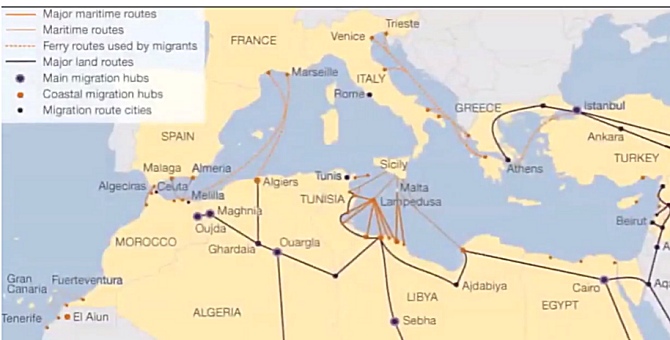Following the shock results of last week’s presidential elections, Dr Rajesh Venugopal examines the Trump phenomenon, which he claims ignores the fact that voting for him had more to do with being white than being poor.
Was Donald Trump’s victory a revolt of the poor against the rich? Was this about globalisation and out-of-touch elites? As with Brexit, people are struggling to find explanations for the shocking outcome of 11/9 – and one thing that they are now repeatedly being told by their TV sets is that this was about class and a dispossessed majority.
Academics, pollsters and pundits are all explaining how the new right-wing populism that brought Trump to power is because of those left behind by globalisation. The argument is that people who endured de-industrialisation, impoverishment and political marginality have finally fought back. The dispossessed and disempowered, who were ignored and sneered at have now dethroned the political elite.
There is much that rings true in this argument –in the last two decades, economic globalisation and the centrist political consensus has led to the un-mooring of left-wing parties from their traditional base and allowed right-wing demagogues to step in and speak for the poor. It was the deep anger in the rusted out hull of the formerly industrial heartland –Michigan, Ohio, Pennsylvania and Wisconsin that has, as Mick Moore describes, been decisive in tilting those key states to Trump.
The idea that the Trump phenomenon is primarily about class makes us understand it in a particular way. It conveys the sense that behind the anti-immigrant rhetoric and the racism of his campaign, the real underlying cause was poverty and political exclusion. Racism was just the way it got captured and expressed. If this argument were to hold – and it is all about the poor and marginalised – then it also opens to speculation the possibility that progressive populist Bernie Sanders could have done better.
But the problem is that the data just doesn’t support this analysis. It is simply not the case that Trump won because the poor and dispossessed voted for him. That may be how people explain their decisions to themselves and to others, or the way that the new demagogues represent their political movement – that they are fighting to take their country back for the people from the corrupt elite. But the underlying patterns and evidence expose a different reality.
The overblown analyses of Hillary Clinton’s failure are misplaced because of the overlooked fact that she actually won the popular vote. With a 200,000 vote majority, she evidently connected with the voters quite well and better than Trump on average. The fact that she lost the election has to do with the distortions of the US electoral college system that greatly magnifies the votes of some – such as those four rust belt states – to such a disproportionate extent that it has tipped the result the other way.
Even in terms of understanding the role of class in the election, it turns out that the poorer voted for Clinton and the wealthier for Trump. Of those earning under $50,000, Clinton was significantly ahead. Of those earning over $50,000, more voted for Trump. Of course, this reflects the fact that immigrants and non-whites are disproportionately poorer. This complexity and overlap between race and class is at the heart of understanding why the idea of an economic anti-elite revolt is incomplete, if not misleading.
Race – and not class –was the most reliable explanatory factor behind voting choice on Tuesday. CNN exit poll data shows that 58% of whites voted for Trump and 74% of non-whites voted for Clinton. Astoundingly, white women voted with a huge margin of 53:43 for Trump, as did white voters across the board. Whites with lower income and education did vote for Trump over Clinton – but so did better educated and wealthier whites. Poor rust belt whites voted for Trump – but so did poor whites everywhere else. And so did non-poor whites in the rust belt. Being poor added something to it, but overall, voting for Trump had more to do with being white than being poor.
What this means is simple – this race was determined by race. Race, not class, gender, or education, was the fundamental determinant of voting choice. Race doesn’t necessarily mean racism. It also doesn’t mean class or other factors were irrelevant – because they clearly had some impact. Comparisons are odious and hypothetical counterfactuals are worse – but under this logic of voting, it does not appear that Bernie Sanders would have done any better than Hillary Clinton – unless he could have improved the turnout.
Economic deprivation and an anti-elite revolt may well have played a role in the election. But they do not add up as adequate explanations for the outcome, and not even in the direction of causality that is suggested. It wasn’t the wretched of the earth that fought back against the elite on 11/9. If anything, it was the wealthier that fought to keep the wretched in their place.
Dr Rajesh Venugopal is a Lecturer in International Development and Managing Humanitarianism at the department of International Development.
This article was originally posted in the Wire.in.






thanks very much for this including your ‘unless’ regarding particularly the democrats’ turnout, and, disposal of any worries about how, as ethnographic, emic, data on this missing link might reveal, gender was or wasn’t played by voters from whatever party as a card.. But then, if there is no chain, hey ho for missing links, and, regarding counterfactuals, where in such analysis do they begin or ever end?